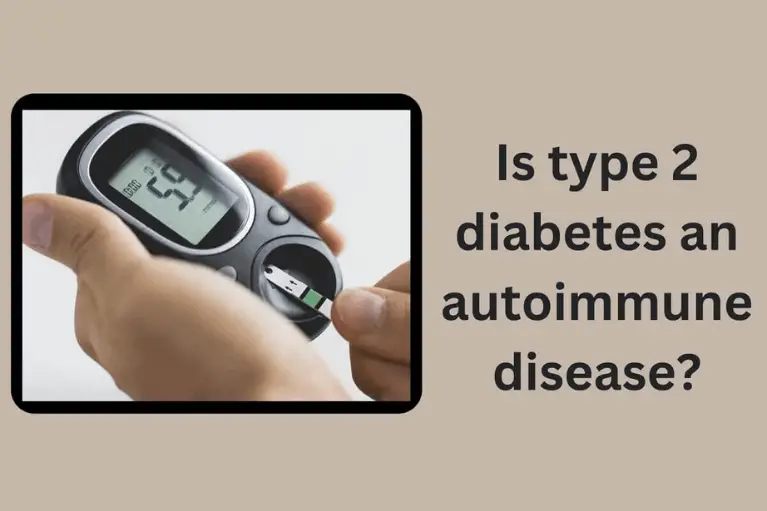Is Type 2 Diabetes an Autoimmune Disease?

Researchers and doctors have assumed that type 2 diabetes is a metabolic disorder for decades. It usually occurs when the natural chemical processes in our body aren’t working correctly. However, some researchers believe that type 2 diabetes can be an autoimmune disease. If it’s right, it can be treated with prevention and other approaches.
Currently, no substantial evidence can prove type 2 diabetes is an autoimmune disease. Doctors have tried to treat type 2 diabetes with preventive measures like diet and lifestyle changes. If it doesn’t work well for the patient, they are introduced to insulin and medications as the second option.
Continue reading to get the latest information about type 2 diabetes. You will also get a detailed analysis of “Is type 2 diabetes an autoimmune disease?”
Is type 2 diabetes an autoimmune disease?

Based on the research, scientists are redefining type 2 diabetes. It was accepted as a metabolic condition, but now researchers believe it could be an autoimmune disease. If it’s right, then the new treatment plans and preventive tactics can benefit the situation.
These findings can also benefit targeting the immune system for the new treatment plans rather than just focusing on preventive measures. According to scientists, insulin resistance can be due to attacking B cells and immune cells in their body tissue.
Endocrine pathologists will refurbish America’s most widespread illness as an autoimmune ailment through this study. If it gets successful, it will change complete diabetes and obesity-related perceptions. It will also benefit diabetes treatment research. To completely understand this, you must know about the differences between type 1 and type 2 diabetes.
Read More: Everything You Need to Know about Chinen Salt for Diabetes
Type 1 and type 2 diabetes
Despite the similar names, we take type 1 diabetes as a completely different disease than type 2 diabetes.
Type 1 diabetes
Type 1diabetes is an autoimmune disease generally diagnosed in teens and children. But it’s not age specific and can appear at any time. In type 1 diabetes patients, the immune system wrongly attacks its healthy tissues and also destroys the pancreas’ insulin-producing cells.
The damage from such attacks makes it difficult for the pancreas to supply insulin to all body parts. Without the required insulin, the cells don’t get good energy. In addition, the blood glucose level continuously increases, which results in increased thirst, frequent urination, and irritability.
Type 2 diabetes
It occurs when our body becomes insulin resistant and slowly stops producing the required insulin. The hormone moves the insulin from your cells to the blood. The body cells convert glucose to energy.
Type 2 diabetes can occur at any age, but it’s ordinary in older people. During diabetes, your body doesn’t use glucose without insulin, and thus you start seeing the symptoms like increased hunger, fatigue, and blurred vision.
Risk factors
Is type 2 diabetes an autoimmune disease? Here are some of the common risk factors for type 2 diabetes:
Weight: Obesity and being overweight one of the main risks.
Fat distribution: Soring fat primarily in the abdominal area instead of the thigh and hips puts you at a greater risk. Type 2 diabetes risk increases in people with a waist circumference of 40 inches mean 101.6 centimeters, and a woman with a measurement above 88.9 centimeters means 35 inches.
Family history: The risk of type 2 diabetes increases when your siblings and parents have type 2 diabetes.
Blood lipid level: The type 2 diabetes risk increases with a high level of triglycerides and a low level of good cholesterol, high-density lipoprotein.
Age: The type 2 diabetes risk increases with age, especially when you cross the age of 45 years.
Inactivity: The less activity level puts you at greater risk of type 2 diabetes. Physical activity benefits in controlling your weight, using glucose as the energy source, and making you more sensitive to insulin.
Race and ethnicity: Though the reason isn’t apparent, people with specific races are more likely to get type 2 diabetes than white people.
Prediabetes: It’s a condition in which the blood glucose level is more significant than usual, but it’s not so high that it can be classified as diabetes. If left untreated,n it can be classified as type 2 diabetes.
Polycystic ovary syndrome: It’s a condition in which the person experiences irregular menstrual periods, obesity, and excess hair growth in their body. This condition also increases the type 2 diabetes risk.
Darkened skin areas: The dark areas in the armpits and around the neck indicate insulin resistance.
Pregnancy-related risks: The risk of type 2 diabetes increases when you develop gestational diabetes. It mostly happens during pregnancy or when you give birth to a baby that weighs more than 4 kilograms.
What does the research say: Is type 2 diabetes an autoimmune disease?
The research says that these two types of diabetes are much more common than we believe. Since the last decade, researchers have started testing the idea that type 2 diabetes is also an autoimmune disease.
An autoimmune disease occurs when a person’s immune system mistakenly starts attacking the healthy tissues and cells of the body. There is continuously growing evidence that the following properties can be present in diabetic people.
- Low-grade and long-term inflammation at different stages. It may change from the initial changes to the developmental complications.
- Unusual antibodies activity
- Changes in the function and number of immune cells
- Changes in T cells
According to the 2019 research, they show an anti-inflammatory response and may also indicate autoimmune activity.
What makes our immune system respond that way?
The exact cause of the immune response is still unknown, but some autoimmune theories may help explain this malfunction. It can be the result of the following:
- Chemical irritants
- Drugs
- Bacteria
- Virus
- Environmental factors
Once the body’s natural defense system becomes off balance, our immune system response becomes prominent. Sometimes in this response, our healthy cells and tissues get caught. The thing that we all know is that it runs in families and mostly in females.
Injury is also a leading cause of such responses. After an injury, a specific body part that goes through high stress can trigger a heightened reaction. Since the autoimmune disorder terminates the body’s healthy tissues, it can also interrupt the functioning of organs, which can result in abnormal growth.
A proper treatment plan can benefit in restoring the function of the organs and controls the disease.
Prevention
You can prevent type 2 diabetes by making healthy choices, even if you have a family history. If you are pre-diabetic, lifestyle changes can stop or slow the diabetes progression.
Healthy lifestyle changes
The healthy lifestyle changes include the following:
Healthy foods
Eat foods that are high in fiber but low in calories and fats. Such foods include vegetables, whole grains, and fruits.
Losing weight
They are losing the excess weight and keeping it off, delaying prediabetes progression. If you are pre-diabetic, losing the extra amount of body fat will benefit you in avoiding type 2 diabetes condition.
Be active
Try moderate and vigorous aerobic activity for at least 150 minutes a week. Aerobic exercises include running, bicycling, swimming, and even brisk walking.
Avoid the more extended period’s inactivity.
Sitting in the same position for long periods can increase the type 2 diabetes risk. Try getting up every 30 minutes, even for a few minutes walk.
People with prediabetes conditions are often recommended metformin which is a diabetes medication. This oral medicine reduces the type 2 diabetes risk. It is generally recommended for older adults and people who are overweight and find it very difficult to control their blood glucose level with lifestyle changes.
Implications for type 2 diabetes treatment
If type 2 diabetes is an autoimmune disease, it can significantly impact the explanation of obesity. It will also affect the treatment plan for obesity-induced diabetes. Currently, doctors are treating type 2 diabetes with two different approaches.
The first is a healthy lifestyle, and the second is a regular exercise and diet plan. These two are the pillars of the treatment plans. After these options, doctors prescribe oral medications that increase the body’s ability to use insulin and perform different functions.
If the medications aren’t working, your physician may prescribe you insulin. Insulin injections benefits in absorbing glucose and generating energy from it. Many diabetic patients successfully postpone insulin injections with lifestyle improvement and medications.
Is type 2 diabetes an autoimmune disease? If the answer to this question becomes clear, then the diabetes treatment strategy can be changed completely. For type 1 diabetes, a doctor can introduce insulin therapy in the early stage.
According to the research, if type 2 diabetes is an autoimmune disease, it can respond to drugs that improve the immune response.
Immunosuppressant medications
Immunosuppressant medications include rituximab. It belongs to a group of drugs famous for anti-CD20 antibodies—these medications benefits in targeting the immune cells that attack the healthy tissues and eliminate them.
According to the 2011 study, anti-CD20 antibodies aid in the diabetes prevention of lab mice at high risk of type 2 diabetes. This treatment plan even benefits in restoring blood sugar levels to normal.
Some research indicates that the medications affect the immune system and benefit type 2 diabetes patients. These immunosuppressant medications, like anti-CD20 antibodies, prevent the immune system, like the B cells, from targeting the body’s healthy tissues.
These days’ doctors are using anti-CD20 medications to treat autoimmune diseases. Using these immunosuppressant medications for diabetes treatment is not in practice, but the research result is promising.
Conclusion
Before, doctors and researchers believed that type 2 diabetes was a mere metabolic disease. But according to the latest research and statistics, type 2 diabetes can be an autoimmune disease. If the study gives complete evidence, we can have new preventive and treatment methods.
We have limited evidence, and still, more studies are needed to confirm it. So the answer to the question, “Is type 2 diabetes an autoimmune disease?” is confusing. Doctors treat type 2 diabetes patients with medicines, insulin, and lifestyle changes. Now that you know everything, you can better understand what to expect.
Frequently Asked Questions (FAQs)
Why is diabetes known as an autoimmune disease?
We all know that type 1 diabetes results from an autoimmune process in the body. It mistakenly destroys insulin and beta cells and is expected in genetically inclined people. We don’t know the leading cause behind this autoimmune destruction, but it can be due to environmental factors.
Is type 2 diabetes reversible?
Currently, there is no permanent cure for type 2 diabetes, but few studies show that some people successfully manage to reverse it. They could reach and hold the average blood glucose through weight loss and diet changes without using medications. But unfortunately, it doesn’t mean they are cured, as it’s an ongoing disease.
Who is at high risk of type 2 diabetes?
People above 45 are at high risk of developing type 2 diabetes. Teenagers, young adults, and children can also get type 2 diabetes, but it’s more common in older and middle age people.
Can I get type 2 diabetes after eating a lot of sugar?
Sugar consumption directly doesn’t cause type 2 diabetes. But once you get overweight, you will risk getting it. When you gain more calories than you need and continuously eat sugary foods, you will most likely get type 2 diabetes.
References
https://www.mayoclinic.org/diseases-conditions/type-2-diabetes/symptoms-causes/syc-20351193
https://www.healthline.com/health/type-2-diabetes/is-type-2-diabetes-an-autoimmune-diease#takeaway





